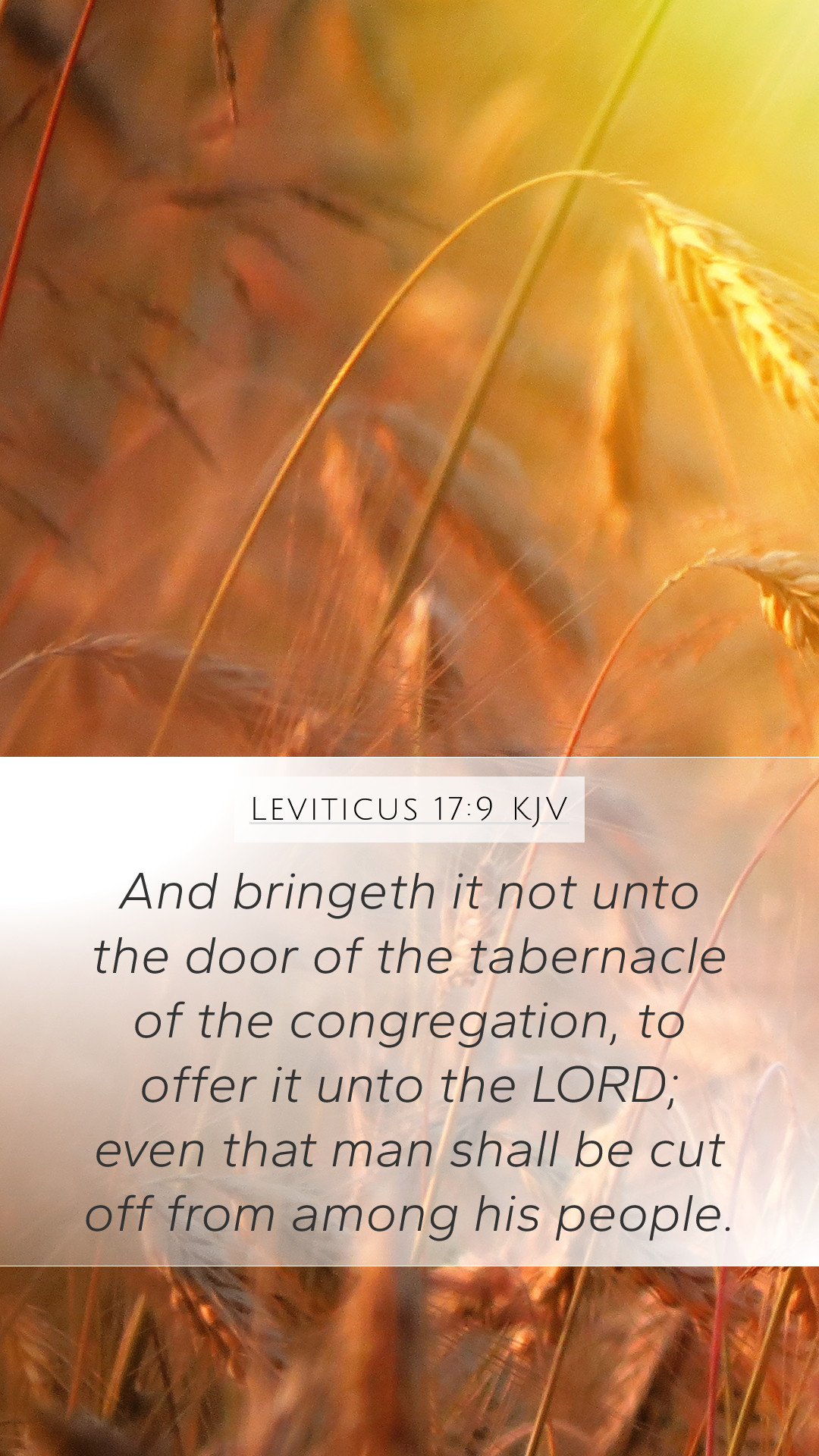Understanding Leviticus 17:9
The verse Leviticus 17:9 states:
"And any man of the house of Israel, or of the strangers that sojourn among them, that eateth any manner of blood; I will even set my face against that soul that eateth blood, and will cut him off from among his people."
Summary and Meaning
This command is centered on the prohibition against consuming blood, which is deeply rooted in the holiness and sanctity of life in the biblical context. Let’s explore the insights from various public domain commentaries:
Matthew Henry's Commentary
Matthew Henry emphasizes that the life of the flesh is in the blood, asserting that blood represents life itself and is sacred to God. He notes that God's people are called to respect the divine laws concerning blood to maintain a distinction from the surrounding nations who might not acknowledge such a sanctity. Additionally, Henry points out the serious consequence of violating this command, highlighting that one who chooses to disregard this divine ordinance will face severe repercussions, signifying a complete disconnection from the covenant community.
Albert Barnes' Notes on the Bible
Albert Barnes elaborates on the significance of abstaining from blood, noting that this command not only serves as a physical restriction but also signifies spiritual obedience to God's covenant. Barnes reflects on the communal aspect of this command within Israel, pointing out that it was a common practice for the neighborly bonds of the people to be observed and maintained through adherence to these divine instructions. Failure to comply would not only put one's soul at risk but disrupt the corporate unity of Israel.
Adam Clarke's Commentary
Adam Clarke discusses the broader implications of the prohibition, connecting it to the overall theme of holiness in the Israelite community. He stresses that blood is considered the atoning factor for the soul, and thus should only be used in accordance with God's established rituals, particularly in sacrificial practices. Clarke also highlights that the admonition against blood consumption is intimately linked with the sacrificial system, revealing God's desire for His people to engage intimately in the act of worship and remembrance of atonement in their lives.
Key Themes and Insights
The core themes of Leviticus 17:9 include:
- Sanctity of Life: The blood symbolizes life and signifies God's creation and sovereignty over it.
- Obedience to God’s Command: Adhering to His laws reflects a faithful commitment to the covenant community.
- Consequences of Disobedience: Ignoring these commands results in spiritual and communal repercussions, emphasizing the seriousness of sin.
- Spiritual Purity: The dietary restrictions underline the call for holiness, differentiating the Israelites from other nations.
- Covenant Identity: Practices related to blood and sacrifices shape the identity and communal worship of God's people.
Bible Verse Interpretation and Application
When exploring the meaning of Leviticus 17:9, it is relevant to seek understanding within the narrative context of Israel’s formation as God's chosen people. The meanings derived from public domain commentaries assist in guiding interpretation, and these lessons can be applied to modern life in significant ways:
- Respect for Life: Just as ancient Israelites were taught to respect blood, modern readers are encouraged to view all life as sacred, promoting compassion and justice.
- Understanding Community Standards: The notion of obedience to higher laws and community standards applies today; individuals are called to consider how their actions impact the greater community.
- Reflection on Spiritual Practices: The concept of sacrificial offerings translates into modern faith practices where believers focus on acts of mercy and service as contemporary forms of worship.
Additional Bible Cross References
Leviticus 17:9 resonates with several other Scripture passages that reinforce its themes:
- Genesis 9:4: Prohibition against consuming blood, emphasizing its sacredness.
- Leviticus 10:1-2: The consequences of disregarding God's commands regarding sacred practices.
- Hebrews 9:22: The importance of blood in atonement, linking Old Testament laws to New Testament theology.
Final Thoughts
In conclusion, Leviticus 17:9 offers profound insights into the relationship between life, worship, and community within biblical law. By engaging with biblical exegesis through commentaries and scripture analysis, one can deepen their understanding of Scripture and apply these ancient truths to contemporary faith contexts. As believers delve into Bible study materials, they can explore how to interpret Bible verses in ways that yield meaningful applications for daily life.


